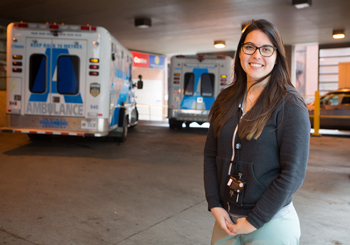Q&A with Stephanie Lucchese

By James Wysotski

Stephanie Lucchese, a registered nurse in Psychiatric Emergency Services. (Photo by Katie Cooper)
Stephanie Lucchese is an RN in the Emergency Department who specializes in crisis intervention. She’s championing the implementation of a Registered Nurses’ Association of Ontario Best Practice Guideline to help nurses better respond to patients in crisis.
Q. What are some of the biggest challenges you face in your role?
We’re an inner-city hospital and the social determinants of health affect our patients’ mental status and well-being. So we’re not just looking at their mental health, we’re looking at social issues such as housing – and there isn’t a lot of housing available for homeless patients. Some outpatient resources have such long waitlists that it’s hard to connect patients to the resources that will help them.
Q. What changes are you leading in Psychiatric Emergency Services?
My quality improvement initiative suggested that crisis RNs should provide holistic assessments across the ED, but especially in psychiatry. As a result, we’re creating a role called the mental health nurse liaison. This nurse will follow mental health patients through the ED and provide them with psychiatric care. It’s particularly important for mental health patients visiting the hospital with physical ailments that require treatment first. These patients are usually triaged to ambulatory and acute care, but now the mental health nurse liaison can move with them to provide psychiatric care and mental status assessments at the same time. Before now, there wasn’t anything like this role in Toronto’s downtown hospitals. It exists in the United States, England and Australia, but they don’t have mental health units in their EDs. I’m excited because now we’re going to have both.
Q. What are some of the challenges your patients face?
Our patients are concerned about stigma. A lot of patients won’t seek psychiatric help because they fear the label caused by a diagnosis and how it will affect their daily lives. It’s sad, because the earlier they get treatment, the higher their chances of continuing to be high functioning. Some patients choose not to take medications and it has a negative effect on their lives.
Q. The Emergency Department expansion is underway. What are you most looking forward to about the new space?
Our new Mental Health Emergency Services Area will be its own unit with more beds. We see a high volume of patients every day, so more beds means we can respond faster to patients with a mental crisis.
Q. How do you unwind after stressful days in the ED?
I love to travel. I try my best to travel as often as possible with my husband, to see new things and recharge my batteries. If we don’t take care of ourselves, it’s hard to take care of others.
About St. Michael’s Hospital
St. Michael’s Hospital provides compassionate care to all who enter its doors. The hospital also provides outstanding medical education to future health care professionals in more than 29 academic disciplines. Critical care and trauma, heart disease, neurosurgery, diabetes, cancer care, and care of the homeless are among the Hospital’s recognized areas of expertise. Through the Keenan Research Centre and the Li Ka Shing International Healthcare Education Center, which make up the Li Ka Shing Knowledge Institute, research and education at St. Michael’s Hospital are recognized and make an impact around the world. Founded in 1892, the hospital is fully affiliated with the University of Toronto.
